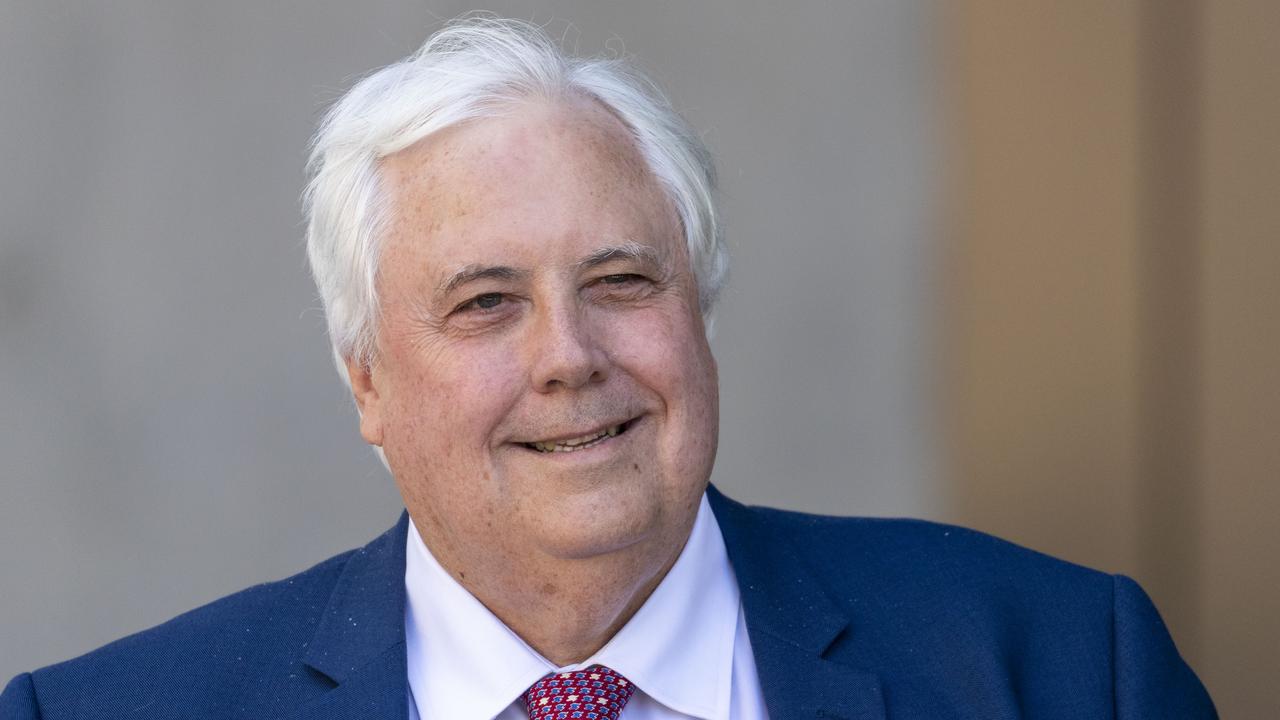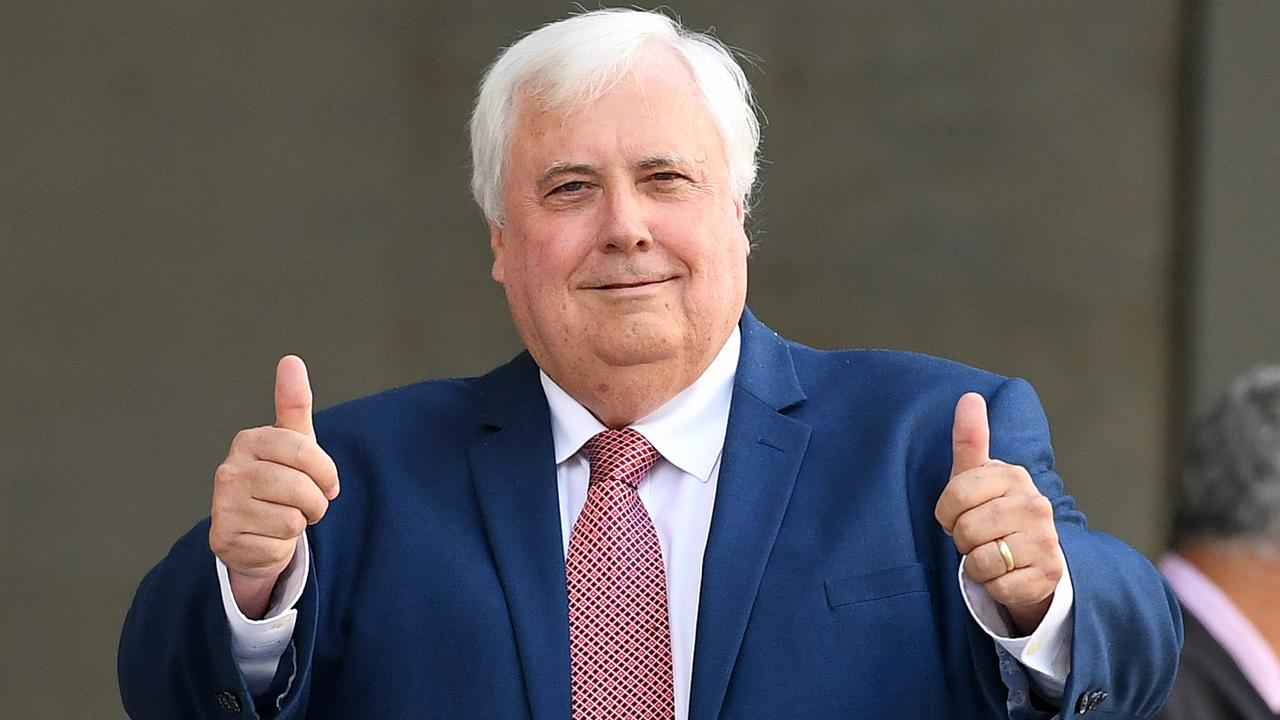Clive Palmer nickel refinery ‘insolvent trade’ doubt
Clive Palmer’s Queensland Nickel knew months in advance it would run out of money by early last month.

Clive Palmer’s Queensland Nickel knew months in advance it would run out of money by early last month, raising the prospect that it may have been trading while insolvent and potentially exposing the federal MP and his nephew director to being pursued over any debts racked up by the refinery in its final days.
Internal forecasts obtained by The Weekend Australian show Queensland Nickel was aware as early as August that it would slide into a prolonged cash deficit by December 7, but it was not until this week that it appointed administrators, with the amount owed by the refinery appearing to have blown out over that period.
Legal actions by Mr Palmer’s companies Mineralogy and Queensland Nickel against the MP’s estranged Chinese business partner have left a trail of sworn statements by senior executives that warned of the refinery’s “perilous” financial position months before it was put into administration.
Mr Palmer claimed yesterday that $250 million in assets from two of his other companies, which were not named, had been pledged to secure workers’ entitlements at Queensland Nickel and to support its day-to-day operations. “We’re not walking away,’’ he told the ABC. “We do things because they’re hard, not because they’re easy.”
Sources close to the company told The Weekend Australian late on Thursday that two Palmer entities — China First and Waratah Coal — had not provided any recent financial assistance to Queensland Nickel. The companies registered claims to be secured creditors over Queensland Nickel’s assets four days before the refinery slipped into voluntary administration.
Mr Palmer’s personal liability over any Queensland Nickel debts, if it is deemed to have been trading while insolvent, will hinge on whether he was acting as a “shadow director”. That would require any eventual liquidator of the company to establish that Mr Palmer exerted influence on the decisions of his nephew and close confidant Clive Mensink, the company’s sole director.
A corporate lawyer said a case could be made that Mr Palmer was a shadow director of Queensland Nickel, after he formally resigned as a director in February.
Mr Palmer represented Queensland Nickel — along with Mr Mensink — at meetings with Queensland Treasurer Curtis Pitt late last year, when they requested a $35m bank loan guarantee.
An FTI Consulting declaration circulated to creditors this week revealed Mr Palmer approached the firm as early as October 11. On that occasion, two representatives of FTI met Mr Palmer, Mr Mensink and other senior QNI executives to discuss the “company’s financial position, near-term financial forecast, and the possibility of arranging near-term funding for the Queensland Nickel group of companies”.
The discussions about possible funding ended one week later.
On January 3, Clive Palmer called FTI Consulting’s Lachlan McIntosh to speak about the possibility of appointing voluntary administrators. Over the next 12 days, Mr Palmer met FTI Consulting on six separate occasions, including the day 237 workers were made redundant.
Sworn affidavits from Queensland Nickel chief financial officer Daren Wolfe during one of last year’s legal actions detail how it was Mr Mensink and Mr Palmer who decided to keep the perilous financial position of the company a secret from the workforce.
“The detailed cashflow analysis and dire position that would cause for QN has been kept confidential at the request of Mr Mensink and Mr Palmer, so as not to alarm other senior management and employees at the refinery,” Mr Wolfe said.
The insolvency industry relies heavily on the 14 indicators of insolvency spelt out by Victorian Supreme Court judge Philip Mandie in his landmark decision against John Elliott and Water Wheel Holdings. Among those indicators are: continuing losses; overdue taxes; a poor relationship with a company’s current bank and an inability to borrow more funds; no access to alternative finance; and creditors going unpaid outside trading terms.
Sworn affidavits show that Queensland Nickel: bled more than $145m in net negative cashflow from 2013 to last year; owed the tax office $4.6m in unpaid fuel excise; had been denied an overdraft by Mr Palmer’s long-term banker National Australia Bank; had been knocked back by other major banks and was unable to draw extra funding from Mineralogy due to Mineralogy’s own dwindling cash position; and, had unpaid invoices from Aurizon dating back to June last year.
The court affidavits explicitly spell out the financial pressure that was building on Queensland Nickel, with Mr Wolfe stating that the company had become aware of a looming cash deficit in August. Those forecasts predicted a $20m cash deficit by early December, but QN was understood to owe about $70m at the time administrators were appointed.
Mr Wolfe’s affidavit confirms that the concerns about the refinery’s financial health were discussed with Mr Mensink.
“In the absence of funding from Mineralogy, I have formed the opinion that the refinery will need to close down, with the consequent loss of jobs and prejudice to the north Queensland community and economy,” Mr Wolfe said in the affidavit.
“I have discussed this with Mr Mensink and he has informed me, and I verily believe that in the absence of funding from Mineralogy QN will terminate the employment of its 767 workers by 4 December, 2015.”
Those sworn affidavits could make it difficult for Mr Mensink and potentially Mr Palmer to argue that they had reasonable grounds to believe the company was solvent as it traded through December and early this month.
The Weekend Australian understands administrators are examining the books of Queensland Nickel to determine if or when the company became insolvent, and whether it had traded after that. Any decision to pursue Mr Mensink and Mr Palmer for insolvent trading would be made by a liquidator or the Australian Securities & Investments Commission. ASIC can pursue directors and shadow directors for insolvent trading. The maximum criminal penalties are fines up to $360,000, five years’ jail, or both.
In a civil case, a court can order pecuniary payments be made to the commonwealth of up to $200,000, on top of the compensation for creditors. ASIC may then ban a director or shadow director for a period of time.


